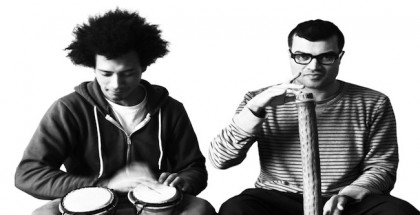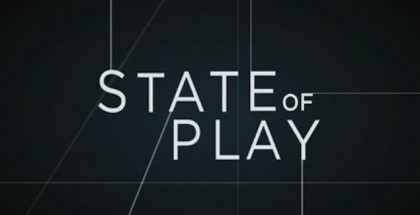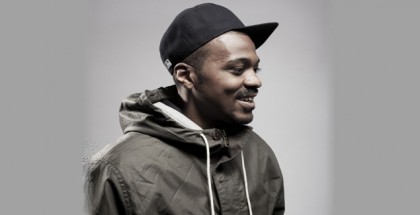Speaking Out: The Rising Stars of Spoken Word
In this special one-off feature, we take a look at the burgeoning landscape of the world of spoken word, through interviews with three of the scene’s rising stars. A rapidly growing art form, especially within the UK, the scene has quickly developed with the help of digital platforms and social media. A spoken word artist’s audience now can range from a handful of like-minded heads in a Brixton basement, to thousands of conscious festivalgoers, to millions of viewers online. These three rising stars are just at the tip of the iceberg.
Humble The Poet
Toronoto-based, former school teacher Kanwer Singh, AKA Humble The Poet has been releasing independently-made videos on Youtube since 2008, but started to make waves after appearing on-stage at Lollapalooza festival in 2012 alongside Radio One DJ, Nihal. Soon after, he collaborated with fellow Youtube star Lilly Singh (better known as Superwoman) on, ‘’Leh’’, gaining over 11 million views. He began collaborating with singer/songwriter Sonna Rele in 2014 and most recently uploaded a version of Justin Beiber’s “Love Yourself” with the singer. He went on to write his first book Unlearn, and released the sequel, Unlearn Beneath The Surface at the end of last year. On his channel he posts weekly spoken word recordings and philosophical ideas on life issues.
Kat Francois
Londoner, Kat Francois is widely renowned on the poetry scene. With over 14 years in the game, she was the 2004 winner of the BBC3 Slam Championship. Cementing a winning streak, she came first place at the World Slam Poetry Championship a year later. She has just returned from South Africa after taking part in the 19th Poetry Africa Festival where she presented Raising Lazarus, her solo play based on the First World War. Francois’ bi-monthly slam sessions Word4Word have been running since the start of her career, showcasing new artists and exposing them to the community. She also heads the Poet’s Platform, a programme that works with young, budding poets.
Andrea Spisto
Islander Andrea Spisto grew up in the Dutch Caribbean and cites her background as a major influence on her creativity. As a member of the Infinite Experience Arts Company, Spisto recently travelled to the Edinburgh Fringe Festival to put on the theatre piece, Wild Dandelions: What Would You Do? She performs at regular open mic shows around London in association with Spare The Poets of the Roundhouse Collective, and just this week was published in a brand new anthology called “001: Conversations”.
Humble The Poet, you’ve become a huge Youtube sensation and have travelled across the globe to perform. How did it all start out for you?
HTP: I’m just looking for a creative outlet and I was a big fan of spoken word after watching a couple of performances in the city. And I was writing poetry since I was a kid so understanding more about spoken word was kind of an evolution of the art, where the audience gets to experience what the poet is feeling and hearing the poem through the writer’s perspective, all the emotion and delivery. I thought it was awesome and important to be a part of. That’s kind of how I started out and I utilised the online space to share my work.
Not only are you a poet, you also have your own web channel discussing life/society issues. You used to be a school teacher, so is this something you feel is a duty to pass on to others?
HTP: It’s not so much a duty, I just took the elements of being a school teacher that I enjoyed, which were encouraging people to have a love of learning and kind of lighting a fire within them to kind of go on their own path. I enjoyed that in my job as a school teacher, but there was a lot of paperwork and assessments. A lot of stuff that is conducive to what I believe is important to the education of an individual. So then, my perfect opportunity was to be a type of educator, student as well that I want to be, where I can share with as many people as possible in a way, without giving them a test at the end. So, it’s not about passing on to others more so than it is connecting to others.
How do you think spoken word has shaped the music industry?
HTP: I think spoken word is considered so new it’s an evolution and considered a literary art. I think it’s definitely impacting the music industry in the sense that it allows vocalists to kinda re-evaluate how they want to deliver their vocals. You’ve got artists like Drake who is consistently looking for different ways to deliver and find flows, write a beat, create a melody. A lot that can be inspired by spoken word, because spoken word isn’t constrained into a certain rhythm or beat type, or like timing with music.
Taking those kinds of risks, I think a lot of that came from the emotions that come with spoken word. As well as providing an outlet for people emotionally. The inability to articulate ourselves which causes a lot of frustration. So I think focusing on the literary art, especially when it helps people to either express themselves or find someone who is expressing what they are already feeling.
Where do you see the future heading for spoken word?
HTP: I think it’s great, I think it will continue evolving. I think it’s going to start to blur lines between traditional hip hop, which I think is important for it to continue to thrive. I think the communities are continually growing. I think people are finding their voices, telling the stories that need to be told that are being told now. People are seeing the appeal, the simplicity of spoken word, because all you need is a story and your voice. It can be done in any different language, different context, different dialects so things will continue to evolve worldwide.
Andrea Spisto: I think you will see a bigger slam scene evolve, however I am not interested in that kind of spoken word since I believe it’s really limiting and the format pushes out other interesting poets. I hope that spoken word will keep evolving and keep challenging the boundaries that are set in the poetry world. We are seeing a lot of spoken word poets delve into story telling and creating spoken word shows. My group Spare The Poets evolved out of our time at the Roundhouse Poetry Collective. We wish to experiment and be bold about our writing, our performance style and our methods of interacting with our audiences.
Kat Francois, you won the BBC 3 Poetry Slam in 2004, when slam poetry was not as widely spread as it is nowadays. How do you think it has changed between then and now?
KF: Slam poetry has evolved, but more than that performance poetry all over the country has evolved. In London you could go to one if not more poetry events each night. There are nights popping up all over the place. There are many good quality events, long standing events like Farrago Poetry, Bang Said The Gun, Word4Word (which is my night, which has been running for 12 years now). There are other nights like Chill Pill and Outspoken, First Fridays and Lipped Ink (both at the Poetry Café), Genesis Slam.
When it comes to slamming, Hammer and Tongue run a national slam, which culminates in a yearly finale usually held at the Royal Albert Hall, which Word4Word contributes to. My night Word4Word runs bi-monthly slams where the winner walks away with £50 and a paid slot at Word4Word in the future.
I think what has changed is the seriousness people are dealing with their spoken word careers. It is seen as a career now. Poets have been going into schools for a long time and teaching poetry, writing and drama skills. Young people see being a poet/writer as a viable career option. They are smart at using social media and modern technology as a way of furthering their careers. I have seen a lot of poets/performers come and go. Real life kicks in, so not everyone has the staying power… relationships, children, real life gets in the way and the life of an artist is not an easy one.
If you have the staying power there are a lot of opportunities. I have had the space to create 2 solo shows, 3 comedy solo shows, and to direct and devise numerous shows with young people. I travel all over the world. I am in fact just back from a trip to South Africa where I took part in a festival called Poetry Africa and where I also performed my solo show Raising Lazarus about Caribbean soldiers in the First Word War. These opportunities all stemmed from winning the slam on BBC3 and then subsequently winning the World Championships a year later. In fact part of my trip to South Africa was putting on a two-hander play, dealing with race, together with a White South African artist, who I met at the Championships all that time ago.
There are a lot of vibrant people pushing the scene forward at the moment; it’s an exciting and progressive environment to be in.
https://www.youtube.com/watch?v=eX96OCoLa7E
You’re a multi-talented woman with comedy as one of your many others ventures in the creative industry. Do you enjoy bringing this aspect to your spoken word?
KF: Comedy is a great way for me to let off steam and also hold the audiences attention during my monthly show Word4Word which is held in the bar of the Theatre Royal Stratford East, every third Sunday. The audience needs a break from the intensity of poetry and that is how the comedy developed. The audience can also be a bit rowdy so in order to gain control and set up the poets over the years I have developed my comedic chat.
I love making people laugh, it is a wonderful gift to have and it also helps to create balance in my own work, which can be quite hard hitting and raw at times.
What’s your role at the Roundhouse?
KF: I do youth work at the Roundhouse. Including running drama sessions and also directing and devising the yearly alternative pantomime course.
I run the Poets’ Platform session at the Theatre Royal Stratford East every Monday. I have been working with this group for 3 years. The group meets every Monday and is for young people of up to 25 years old.
Poets love spaces where they feel safe and can develop their writing judgment free. This is the kind of space I have created. The group has just finished working on their first publication, a book of their poems. Over the three years I have directed and devised a number of spoken word theatre pieces with the group. We work both on written and performance skills. Anyone up to the age of 25 is welcome.
https://www.youtube.com/watch?v=W8T8V_Kkx24
How do you feel your spoken word has evolved and grown over the years?
KF: My performance has evolved from purely a spoken word artist, to playwright, an actress and a writer. I now combine poetry and storytelling. Hosting my own show has helped me to develop my comedic side. I have been performing for 14 years and 2015 was the ten-year anniversary of my decision to go professional. My confidence as a performer has shot up over the years, you cannot buy the experience which performing that long gives you. I am still dedicated to my craft, I still have a lot of work to do, poetry books to write, novels and plays. I am also still developing my performance style of spoken word theatre. I want to direct more work and of course continue travelling more.
One of the things I have learnt is to say yes to whatever opportunities come my way. I have not lost my passion along the way, in fact I am more passionate about what I do than ever before.
https://www.youtube.com/watch?v=HI67OneidA0
Andrea Spisto, you’re an actress as well as a spoken word artist. Tell us a bit about your story, where did it all begin?
AS: I guess it all began in my Mum’s womb when I was a foetus. It was since then that I knew I was interested in creating and performing. It was my impression that everyone had the same feeling about what they wanted to do in life. I started performing in anything and everything as well as pouring myself into art and music and writing. I wanted to combine all of that and be able to share it. Luckily, I was able to do that through the training I received.
Your company recently performed at Burning Man, what was that like?
AS: I wasn’t physically at Burning Man, a part of my company Infinite Experience went to perform a version of our immersive theatre piece, Welcome Home. I had just come back from Edinburgh performing another piece Wild Dandelions: What Would You Do? There is only so much I can stretch myself. I’ve learnt the hard way.
You bring a lot to your spoken word, including theatrics and characters. Your show, What Would You Do? is an example of this. Can you tell us more about that?
AS: What Would You Do? was a complex process which we started in a very intellectual way by asking members of the public, “what would you do if you weren’t afraid?” The reaction was much more intricate than we expected. Fear is such a varied and yet communal presence. Our job as storytellers is to bring to light some of these discoveries and we have to find the space to do it in (this is the tricky part). This is where theatrics and characters as you say come in, they are a way of creating enough space in between the subject and the audience for everyone to take part in our journey.
The show became philosophical in a child-like way, everyone joined in by playing with us. I have realised through the years and through poetry I have no right to tell people what to think and for me creativity isn’t about that, it’s about creating a space where people are invited to ask their own questions.
What made you want to become a poet?
AS: I think everyone is a poet and some people are practising poets. I always write poetry and didn’t realise I could share it in a setting that was open and engaging. Poetry is like storytelling, whether you want to write and perform or just write for yourself. It is a practice I recommend to everyone and regularly welcome viewers to come to open mic.
Is spoken word your way of putting across personal experiences and reaching out to others?
AS: In many ways yes. It’s a way for me to communicate ideas and situations to others in a way that is accessible and creative and that has enough space for people to build their own interpretations.
Why do you think people have taken such a liking to spoken word?
AS: In the recent years there have been a lot of people in the forefront of the spoken word scene in London with influence from the slam scene in America. You get very topical issues poetically balanced in a three minute format. We have seen people like Kate Tempest, Hollie Mcnish, George The Poet and Deanna Rodger really flourishing. Poetry suddenly has become more accessible than what is put in the curriculum at schools, and speaking about current issues.
Follow Humble The Poet, Kat Francois and Andrea Spisto.










